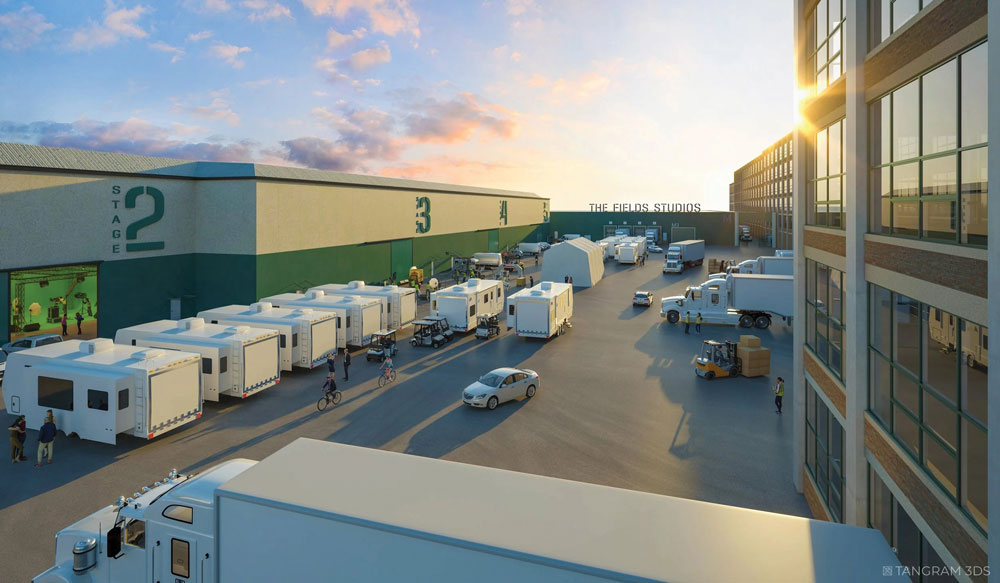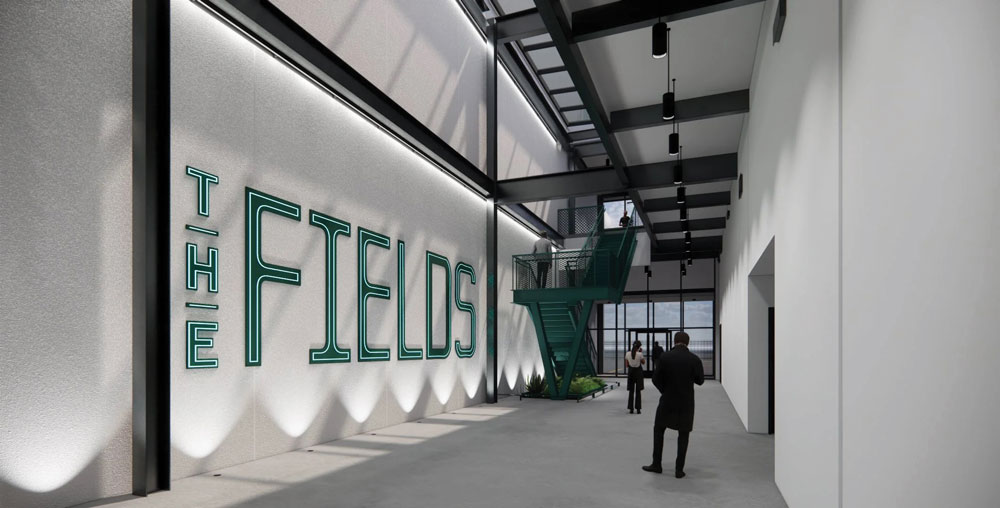The show must go on in the Prairie State.
Momentarily curbed by the WGA and SAG-AFTRA strikes of 2023, which suspended production on staple local television shows like “Chicago Med,” “Chicago PD” and “The Chi” for nearly half a year, the film and television industry in Illinois today has all the markers of a successful economic and creative rebound.
Take the science fiction thriller “Dark Matter,” which has been filming season 2 in 2025 in the city, with its production offices located at The Fields Studios in Chicago. The Fields Studios is the first purpose-built studio campus in Chicago and was designed to be built “for producers, by producers.” The Apple TV+ series adds to other established and new television shows currently or recently shot in Chicago like “The Bear” and “The Deli Boys.”
The entertainment industry in Illinois saw a boom following the steady expansion of its film and TV production tax incentive program since its inception in 2008. In 2024 film production expenditures in Illinois were counted at $653 million, with an estimated 18,200 hires and $351 million generated in wages. This is the second highest total in the state’s history, with 2025 numbers for the industry on track to meet or eclipse the 2022 record of nearly $700 million in yearly production spending.
“Through the Film and TV Workforce Program, we have invested in the future of the industry — increasing diversity and building out a qualified pipeline of hundreds who are equipped to serve on film crews and making it possible for us to attract major productions,” stated Governor JB Pritzker in a press release. “Our success is a testament to our hard work and partnership as well as the undeniable charm of Illinois and our people that makes us a prime creative destination.”
Things Are Up Downstate
Some of the show birds have flown south in Illinois for the next season of the state’s bustling entertainment industry as some look for a change of shooting scenery outside of the Windy City.
Such is the case for 31st Street Studios CEO and developer Chris Breakwell, who sat down with me in a café in Roswell, Georgia, during a well-timed visit to Atlanta to talk about his ambitious designs to build a suite of sound, film and e-sports production studios in Wood River, Illinois.
“The film business can be a bipartisan situation because it can create union jobs and because of the economic development and amount of spending it brings to the local economy,” says Breakwell.
Advantageously placed on the stateline with Missouri, Wood River is located upstream of downtown St. Louis on the Mississippi River. Breakwell aims to replicate the model of film production he has demonstrated before in his hometown of Pittsburgh, where a 300,000-sq.-ft. retrofitted steel mill was used for large action movie productions that included “Unstoppable,” “The Dark Knight Rises” and “Jack Reacher.”
Wood River studios will comprise six stages of varying sizes ranging from 20,000 to 40,000 sq. ft. for large-scale productions to smaller studios of 5,000 to 10,000 sq. ft. for independent filmmaking, esports and recording space for entrepreneurs and online influencers looking to scale their brand.
Wood River, like other studios in Illinois, will benefit from a generous tax credit program for filmmaking that has been in play for years — with a base credit of 30% for qualified Illinois production spending, including post-production expenditures. Another 15% credit on top of that 30% is approved to be put toward salaries of employees on qualified productions that are in communities with high unemployment.
“We are going to be working hand-in-hand with the tourism sector,” Breakwell says of the $62 million Wood River project and the buzz surrounding it. “We had a call with the governor’s office, and they are excited to help push that through. Economic development goes around big cities like Chicago, but if you spend the effort and time to spread the money around, it’s good for everybody.”
Updated technology is a big pull for the Wood River project, which is planned to have shovels in the ground in early 2026 and be ready to handle shooting in early 2027 thanks to the use of modular studio builds that will cut construction time in half compared to a traditional studio construction process. Wood River plans to produce virtual reality and immersive filming projects as one of its media concentrations on its lot, Breakwell notes.
This growing sector of the entertainment industry will be fed by a local talent pool of students engaged in emerging media at Wood River High School and the University of Missouri-St. Louis. These institutions are noted for their esports program and student engagement, a natural local connection that should contribute to workforce development efforts in the burgeoning VR, esports and emerging technologies sector.
A motion-capture stage, aided by the advice of Don Marinelli, a long-time educator and founder of immersive filming and alternative media departments at Point Park University and Carnegie Mellon University in Pittsburgh, is also being sought to inform the immersive technologies segment of the entertainment portfolio planned for Wood River.
Tech and Taxes
A chorus of people have noted the success and popularity of the Illinois film tax incentive program, which was seeded in 2008 and is up for legislative renewal in 2032.

A former northwestern Chicago warehouse, The Fields Studios was purchased by Knickpoint Ventures in 2018 and spans 23 acres.
Rendering courtesy of The Fields Studios
Illinois Department of Commerce and Economic Opportunity’s Illinois Film Office Deputy Director Peter Hawley spoke about the changes in the movie world he has felt while heading the film program for Governor JB Pritzker. Hawley credits the Illinois tax credit program as being the key driver of success for the state’s film and TV industry.
“Productions make a decision on where to go because of the tax credit and the incentive,” he says.
The Illinois Film Office is hands-on with building up the hiring base for the entertainment industry in the state, specifically with the Illinois Film and TV Workforce Training Program that started four years ago and is funded by a transfer fee on the film production tax credit. The 2025 cohort of the program graduated 201 individuals, part of a group of over 600 people that have completed this program since its inception.
“We have a robust film and TV workforce training pipeline,” Hawley notes. The Prairie State is known to have several education and training options for individuals aspiring to be part of the entertainment industry, including programs at Columbia College Chicago, Northwestern University, DePaul University, Loyola University and University of Illinois at Chicago. Rock Valley College also has a tuition-free film and TV workforce training program, funded from the Illinois Film Office through the Illinois Department of Commerce and Economic Opportunity (DCEO).
Asked what the biggest difference is in the filmmaking industry today versus five years ago, Hawley immediately notes the advances in technology.
“Obviously, tech is a big difference. Very few people shoot on film anymore. Post-production is completely changed. It’s getting faster and better,” he says. “Technology as we see all around us is a real driver. So many young people have grown up being digital natives, and they just adapt to all of this so much faster, and they have grown up around it the entire time. So, they just know how to be filmmakers.”
The advent of virtual production has also changed the landscape of the entertainment industry in Illinois. Two virtual production stages in Chicago, Smash and Resolution Studios, operate in this space.
“Chicago and Illinois are great places for production, hands down, full stop,” Hawley says. “We don’t have mountains here in Illinois, but you sure do on a virtual stage. You can film a scene set at Oak Street Beach on a summer day — you can film that in a VR stage in January, and no one would know.”
Hawley’s experience as a professional filmmaker and director preceding the COVID-19 pandemic colors his thoughts on the matter.
“That to me is a big driver, and the fact that getting into the film business is not a foreign thing, especially in a market like Illinois and Chicago where you can look around and see film production,” he says. “When I was a kid, you didn’t see it. You did not see a pathway to getting into business if you weren’t in Los Angeles or maybe New York. But now you see it all over the place, and the pathway to get into the industry is much shorter and clear-cut on how to do it.”

